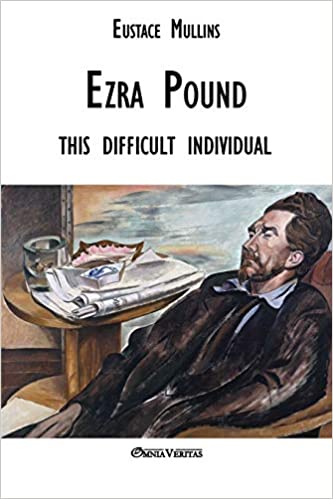
For approximately forty years, Ezra Pound had regarded his critics' antics with mild amusement. The furor over the Bollingen award, which took his native land by surprise, was nothing new to him. He continued to work in his dreary cell; his only recreation was his wife's and friends' daily visits.
On summer afternoons, the Pounds created a little world of their own as they looked down from their height upon the wedding cake dome of the United States Capitol. Usually, they sat near a giant Japanese pine, but because of the ban on taking photographs, I was never allowed to take a picture of Ezra standing beneath this rugged tree, which was so much like him.
Whenever they emerged from the ward, carrying their chairs, their string bags bulging with odd lots of food, books, and letters for the visitors, their pet blue jays always set up a great screeching, wheeling above them as the chairs were arranged. Then the squirrels would come skipping down from nearby trees for their daily treat. Ezra would lure them up onto a bench with a peanut tied to a string. He taught them to take the nut from between his fingers, a practice that I considered reckless.
During these afternoons, Ezra’s manner was that of a deservedly popular professor at a small but highly-regarded school, who was having some of his star students in for tea. His bonhomie was always perfect for the occasion; he was a benevolent Socrates who, as yet, had no intention of drinking the cup of hemlock which his fellow citizens had offered him. Dorothy Pound was also as apt and self-effacing as a professor’s wife as she poured tea, murmured “Shush” when the bluejays became too noisy, and produced little paper bags for the shells of hard-boiled eggs so that we should not litter the lawn.
EZRA POUND is the most controversial literary figure of our time—the same man who edited the work of Yeats and T. S. Eliot, helped introduce the poetry of Robert Frost and influenced the development of Hemingway, was also tried for treason and sent to an insane asylum for his war-time broadcasts from Rome.
For the first time, Eustace Mullins presents the case for Ezra Pound, documenting the tremendous contribution Pound has made to contemporary American culture in a witty and biting criticism of our society, which gives lip service to poetry while imprisoning its major poet.
From Mullins emerges a portrait of Ezra Pound as an eccentric genius, a literary leader who is both outrageously outspoken and unquenchably exuberant—a man who was kind when he wanted to be and quarrelsome when his beliefs were questioned—this difficult individual, Ezra Pound.
“I am opposed. I believe that no American should kill or be killed in order to maintain the fetish value of metal, of any metal." "War is part of a profit." His war admonishments were addressed to all world leaders. He encouraged his countrymen to read and understand the Constitution, which his court-appointed psychiatrists considered a sign of schizophrenia. He was never allowed to have his own psychiatrist. He was charged but never convicted of treason; rather, he was sent to a mental hospital for 13 years as a political prisoner because of the broadcasts. In his view, he would have been guilty if he did not do his duty as a citizen and spoken out. "Pound not only refused to give up his American citizenship but went to a great deal of trouble to retain it."
"It was not Pound, but Churchill, who termed Hitler the “George Washington of Europe”, and who heaped praise on Mussolini".

